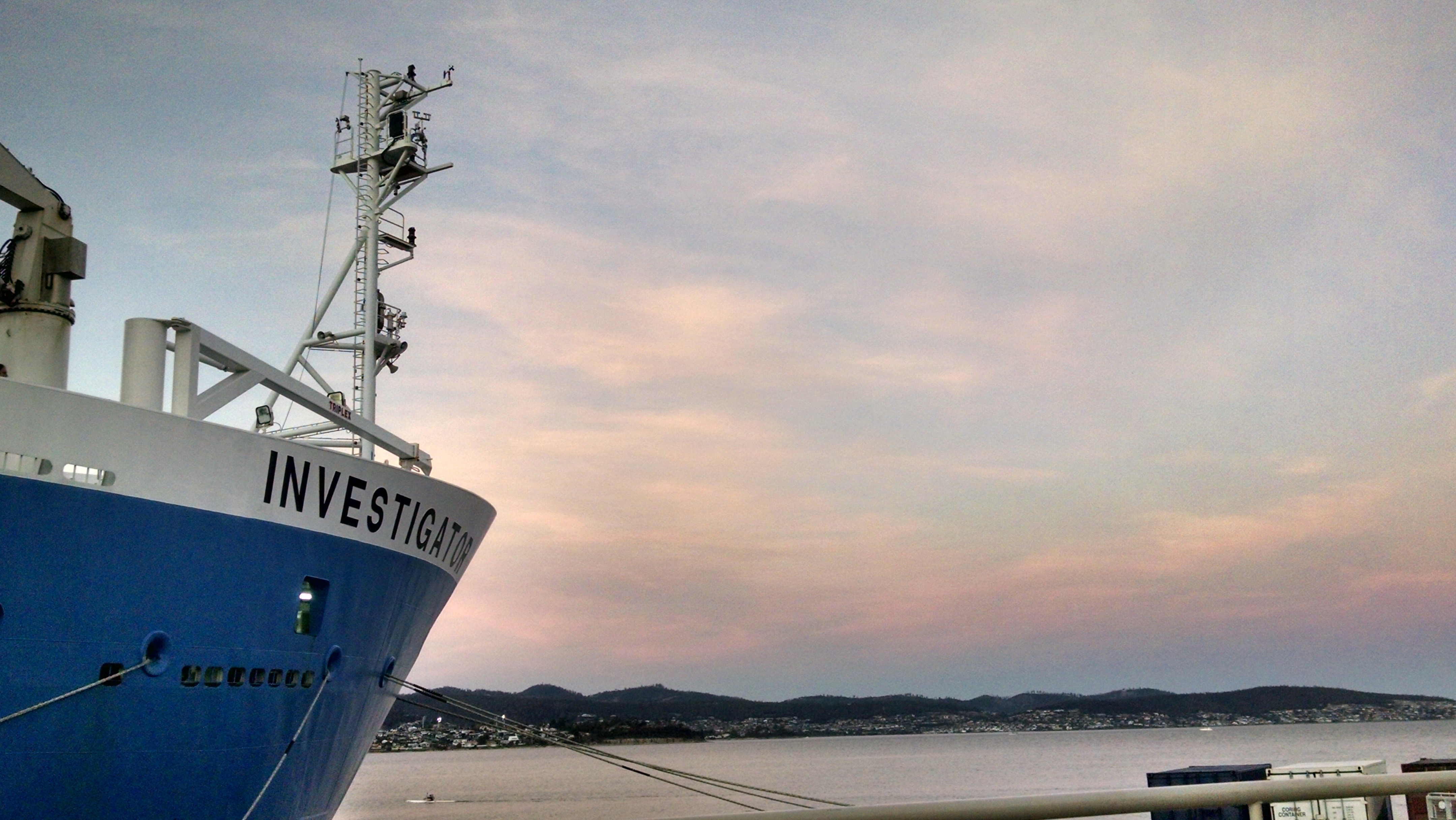I didn’t put too much thought into it before I left – being outnumbered as one of only a few Americans onboard an Australian ship. In my seven-year oceanographic career I have been on 12 ships, so I consider myself pretty well versed – though they’ve all been operated by the US. I’ve heard tales from co-workers about life aboard international research vessels. Tabletop grills with the Koreans, multiple bars and a pool with the Germans, vodka rations and “hostesses” with the Russians.
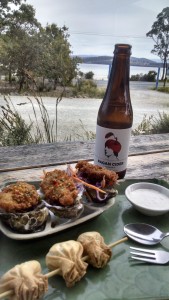
I was surprised to hear that the Aussie ship was dry. Not that I feel the need to get tossed, in fact I enjoy the forced sobriety as a test against dependence, and an easy way to lose a few pounds. Then again, a cold beer or a glass of wine after a long shift would be most welcome sometimes.
After my first visit to the land down under four years ago, I began telling people that I would rather live there than any state in the US besides California. And that’s true, not just a travel anecdote that I use to convince people how much I love Australia. My husband agrees with me. The average Australian we’ve come across on our road trips there is friendly and enjoys good food, good drink, and good times with good friends. This basically covers all my bases for when I’m in charge of my own time.
Here on the Investigator, run by Australia’s CSIRO (Commonwealth Scientific and Industrial Research Organisation), the differences are subtle, but they add up and leave me with a constant reminder that I am not in Kansas anymore. I get into routines, so every day at 15:30 finds me in the mess with a green apple and crunchy peanut butter for snack time. This also seems to be tea time for many of the Aussie scientists and crew. This is noteworthy on its own, as tea time is not really a thing in the US. I’ve never seen so much tea on a ship, and none of it is decaffeinated. Anyway, every single day someone looks at me like I’m an alien for spreading peanut butter on my apple and I have just gotten to the point where I shrug and say “it’s totally a thing in America.” Meanwhile, they’re spreading vegemite on toast and judging me. Perhaps I should see what else I can get away with using that simple phrase.
More often than not I have to get someone to tell me what’s in the dessert, as everything has a different name: pavlova, lamington, wagon wheels, and every variety of “slice” imaginable. Not affecting me, but baffling nonetheless, is the lack of drip coffee. As my travel buddies have discovered, it’s just not a thing in Australia. They’re all about espresso drinks, but with different names than you’re used to in the US. My husband ended up ordering “long blacks” (an Americano – and now that name makes sense) as the closest thing to black coffee.
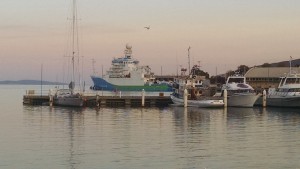
Someone else washes my linens for me, or at least offers to. Every Monday a hamper appears, into which I’m supposed to drop my dirty sheets and towels. Fresh sets are left bundled just outside my door. I’m used to bringing my own as often there are no fitted sheets, which leads to wrestling matches in the middle of the night, me versus the untucked corners around the mattress. And towels are often small and scratchy. So I’m not participating in this particular quirk, the new linens are just stacking up in my room. I wash my towels in my usual ~6 day laundry cycle, my pillowcase every 2 cycles, and that’s it. Apparently there are ships where a steward just comes and strips your bed for you, and then makes it up again. Who needs new sheets on a weekly basis? It’s not like anything interesting is happening in them.
I think this will make me more aware of non-Americans next time I’m on one of our ships. At least they’re speaking English here, I can’t even imagine being on a ship where the majority of dealings were in a foreign language. Before this trip, I’d never been on this side of the “how do you pronounce that” conversation, being asked to say the word “snack” just one more time.
Something about this crew also just seems slightly less salty than the average crew I’ve worked with before. It’s definitely skewed a bit younger. I don’t know much about their backgrounds, but they’re a lively group of guys, chatting and laughing and inclusive. From what I’ve seen, this is generally just the Australian way.
To be fair, there are differences amongst the US ships, mainly due to the home port of the crew members. It’s no wonder I feel most at home on SIO ships, where the crew are generally low-key and friendly and the cooks know that Mexican food should be served on a weekly basis. My second cruise, however, was on a ship based in Louisiana whose usual clientele was exploratory crews for oil companies in the Gulf of Mexico. I thought I had stepped into the past, like a holodeck experience or something. It was clear that the crew wasn’t used to having women aboard and we were originally told that we wouldn’t be allowed to help out on deck. As in, no women handling lines or helping deploy or recover equipment. What?!

It turned out that there were literally not enough people on each shift to operate without using some of the female scientists, so the rule was relaxed. The ROV driver was Japanese, which I don’t think helped the sexist belief that we couldn’t possibly be counted on to do more than hold the end of a rope, if that. Other, less blatant biases were also present. Standard procedure is that your roommate is of the same gender. The only exception I’ve come across is when there is a male-female couple on board and putting them together is the only way to get the gender ratio right. But in this case, the staterooms were in different areas of the ship and we were told that there was no reason for us ever to be in the other gender’s area. If we did have business, we were to go about it with the door open. It felt like being in junior high all over again. The food was also worse than any I’ve come across. Meat and potatoes are staples of most trips, but this was over the top. Fried everything, no salad, and no understanding about what a vegetarian was. Thankfully I am not one, those that were essentially had no protein for two weeks.
Another strikingly different crew I’ve sailed with was on the Knorr, Woods Hole’s ship. WHOI is the east coast equivalent of Scripps, an internationally renowned institution with a technician, PI, or grad student on pretty much every oceanographic project around the world. But the crew is a bunch of ex-fishermen from Cape Cod who cannot survive a fall Sunday without listening to the glory of Tom Brady via thickly-accented commentary on satellite radio. It was a long trip. Then again, the Knorr had the morale-boosting cheese o’clock – at 14:00 every day  a cheese platter was laid out in the galley and many people took their breaks accordingly. Almost made up for all the times I was forced to listen to a discussion about the “best quarterback of all time.”
a cheese platter was laid out in the galley and many people took their breaks accordingly. Almost made up for all the times I was forced to listen to a discussion about the “best quarterback of all time.”

Perhaps I’m putting more emphasis on this whole “being a foreigner” than is fair. Apparently, I fit in better in Australia than in the deep south or New England. I am going to miss it. I was in Australia for nearly a month before we sailed, so the accent and culture are familiar. I’ve started to say “I reckon” and add “have a” before what could be verbs – “I’m going to have a shower” not “I’m going to shower.” Listening to the operations of the ship and scientific equipment on the intercom in the lab reminds me of the Finding Nemo submarine ride at Disneyland. I have yet to hear the word “Crikey”, but just the accent over the radio makes me smile and think of it, and then I’m left with the song “Beyond the Sea” in my head. I think moving around as much as I did as a kid has made me susceptible to other accents and idioms. I once had a roommate at summer camp who was from Long Island, and I came back with a very strange and annoying way of speaking that drove my boyfriend at the time crazy. I’m not sure I’ve said the full word “breakfast” since I was first in Australia four years ago and learned I could just say “brekkie” and be done with it. Shortening words is something I can get on board with. On the key chains of the rental cars it says “Rego” instead of “Vehicle Registration Number” or whatever cumbersome description is on that of American rental cars. Amazing.
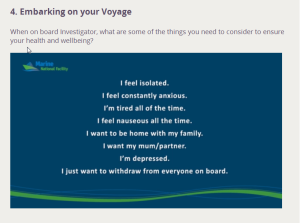
Something that I did really like during the pre-cruise formalities was a video I had to watch that outlined the emotional difficulties of going out to sea. The skeptical side of me wonders if this is done to fulfill some litigious requirement, the equivalent of a waiver. It’s fine if that’s true, but it may also be that someone just thought it would be a good idea to open a dialogue in advance. If I had been shown this video before my first cruise, a lot of grief could have been avoided. There’s always someone on the ship who’s emotionally unprepared to be there, and it doesn’t have to be that way.
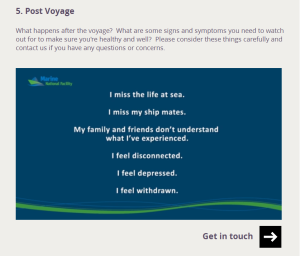
Following my usual behavior of “(over)sharing is caring” I am pretty open about the rollercoaster that ensues when I’m away from home for an extended period of time, on a ship with people I don’t get to choose, and working a schedule in which I have no input. At some point on every single cruise I experience elation, giddiness, depression, exhaustion, insomnia, jealousy, infatuation, you name it, the full range. I know that it’s going to happen, so I’m able to ride it out, and reach out to people onboard or back home depending on my needs. But that took a while for me, to see the pattern and figure out how to navigate through it.
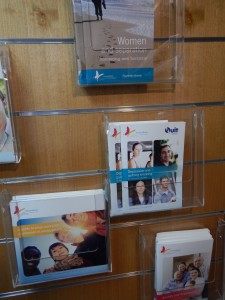
The short video CSIRO made all participants watch could go a long way towards helping people do the same. If that wasn’t enough, they also sent a video to my designated emergency contact (my husband) that detailed what I may go through, what he may go through, and how to be supportive. There’s also a wall full of pamphlets in the lounge on the ship. Part of the ship orientation, beyond just where the fire extinguishers and lifeboats are, is an urging to look out for each other. Ask people “How you going?” (another Australian saying I’m liable to bring home with me), and tell someone if your roommate seems depressed or is having a hard time. We’re allowed reasonable use of the satellite phone to keep in touch with loved ones. Internet access is the best I’ve ever experienced on a remote voyage, which goes a long way towards not feeling out of touch.
Overall, I feel extremely well taken care of. But as much as I will miss the accent and the outgoing people, I look forward to being back home – where everyone knows that apple + peanut butter = the perfect snack. It’s the little things.
